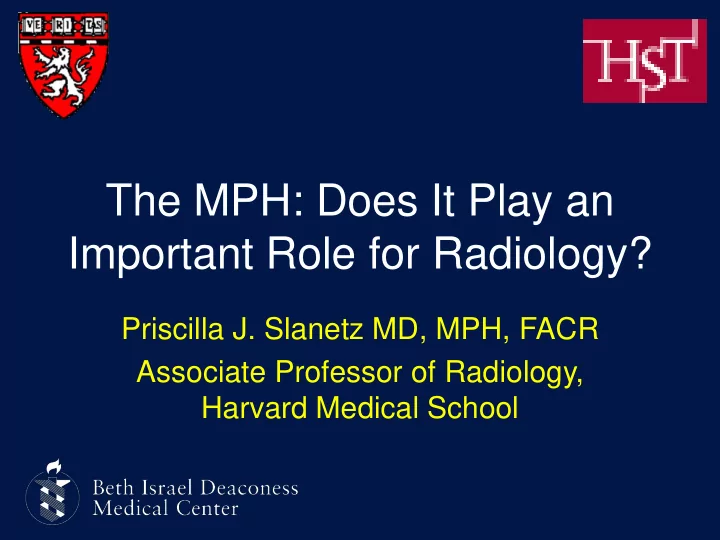

The MPH: Does It Play an Important Role for Radiology? Priscilla J. Slanetz MD, MPH, FACR Associate Professor of Radiology, Harvard Medical School
No disclosures
Educational Objectives • Define what constitutes public health • Describe the advantages of acquiring an MPH during a career in radiology • Explain potential applications of MPH in radiology • Clinical effectiveness • Health policy • Global health • Quantitative methods
Hippocrates 400 B.C. “The function of protecting and developing health must rank even above that of restoring it when it is impaired.”
Abraham Flexner 1910 “…the physician’s function is fast becoming social and preventive, rather than individual and curative. Upon him society relies to ascertain, and through measures essentially educational to enforce, the conditions that prevent disease and make positively for physical and moral well- being.”
Public Health vs. Medicine Public Health Medicine Primary focus on population Primary focus on individual Public service ethic, tempered by Personal service ethic, conditioned by concerns for the individual awareness of social responsibilities Emphasis on prevention, health Emphasis on diagnosis and treatment, promotion for the whole community care for the whole patient Public health paradigm employs a Medical paradigm places predominant spectrum of interventions aimed at the emphasis on medical care environment, human behavior and lifestyle, and medical care Multiple professional identities with Well-established profession with sharp diffuse public image public image Harvey Fineberg, M.D., Ph.D. 1990 Courtesy of Rika Maeshiro MD, AAMC, Washington D.C.
Public Health vs. Medicine Public Health Medicine Biological sciences central, stimulated by Biological sciences central, stimulated by major threats to health of populations; needs of patient; move between move between laboratory and field laboratory and bedside Numeric sciences an essential feature of Numeric sciences increasing in analysis and training prominence, though still a relatively minor part of training Social sciences an integral part of public Social sciences tend to be an elective part health education of medical education • Clinical sciences peripheral to • Clinical sciences an essential part of professional training professional training Harvey Fineberg, M.D., Ph.D. 1990 Courtesy of Rika Maeshiro MD, AAMC, Washington D.C.
10 Essential Public Health Services • Monitor health status to identify community health problems. • Diagnose and investigate health problems and health hazards in the community. • Inform, educate, and empower people about health issues. • Mobilize community partnerships to identify and solve health problems. • Develop policies and plans that support individual and community health efforts. • Enforce laws and regulations that protect health and ensure safety. • Link people to needed personal health services and assure the provision of health care when otherwise unavailable. • Assure a competent public health and personal healthcare workforce. • Evaluate effectiveness, accessibility, and quality of personal and population-based health services. • Research for new insights and innovative solutions to health problems. Courtesy of Rika Maeshiro MD, AAMC, Washington D.C.
Public Health and Radiology in 2011 • Multidisciplinary effort to protect and promote public health and well-being working collaboratively with specialists in: • Preventive medicine • Emergency medicine • Internal medicine • Family medicine • Obstetrics and gynecology • Psychiatry • Surgery • Pediatrics
Major Public Health Dilemmas in 2011 Infectious Disease Cardiac Disease Obesity Addiction (alcohol, tobacco) Cancer
My Story… WHY? WHEN? PROS CONS
Combined MD-MPH Degrees • Majority obtain during residency or mid- career; some during medical school • Increasing options – More schools offering combined MD-MPH (accept outside students) – On-line and summer-only options (three consecutive 7 week sessions) – Off-site practicum often part of degree (application to real-time environment) – More residency programs and academic hospitals supportive
Combined MD-MPH Program at Harvard 1995-2010 2011: 85-90 medical student applicants to HSPH annually, of which 35-40 enroll in MPH Data courtesy of S. Zapatka, Associate Registrar, HMS and Roberta Gianfortoni , HSPH
So Should You Get An MPH? Timing is Critical Perspective vs. Specific Skill Set Availability of Funding
Potential Applications in Radiology • Clinical effectiveness • Identify the most appropriate, ethical, and cost- effective means of providing health care through prevention, early detection or treatment • Focus in clinical epidemiology, biostatistics, cost- effectiveness, medical decision analysis, health services research, quality improvement, and measurement of health-related quality of life Impact in radiology: Appropriate utilization of imaging Quality improvement
Potential Applications to Radiology • Global health and outreach • Knowledge about and comparative perspectives of different health care systems and resources • Epidemiologic and biostatistical concepts Impact in radiology: Successful integration of imaging into low and middle resource countries resulting in earlier detection and improved outcomes
Potential Applications in Radiology • Health policy and management • Management Focus • Accounting, finance, operations, marketing, information systems, quality improvement, people management and strategy • Policy Focus • Health economics, political science, and applied policy (payment systems, insurance, mental health, and substance abuse) • Bottom-Line: Knowledge about health care systems and economics plus business skill set Impact in radiology: Appropriate reimbursement of services Patient access to appropriate diagnostic tools Keep radiology at forefront of political arena
Potential Applications in Radiology • Quantitative Methods • Analytical and statistical skills for population-based research and practice • Typically based in academic medicine • Application of skills locally, nationally, and internationally Impact in radiology: Conduct statistically sound prospective analyses of imaging techniques/modalities Perform needs assessment for imaging and implement action plans in developing countries
So Should You Pursue an MPH? • YES if: • Interested in global health, health care systems, health policy, quality improvement, or cost- effectiveness • Desire a broader view of health care and health care systems OR • Incorporate public health thought processes into daily clinical practice and to approach health care from a population-basis, not only individual basis
How To Get Started… • 133 accredited medical schools and 46 accredited public health schools nationally – 22 have joint MD-MPH programs – Each school has specific strengths From: www.asph.org
Thank You for Your Attention!
Recommend
More recommend